Thailand has a long history of coups, coups that should put the country back on the right track. After all, Thailand is a special country that according to many coup committing general is better off with one democracy Thai style. The country has so far not had the chance to develop properly democratically. What attempts at democratic development has the country experienced in the first 20 years of this century?
Part 2 today.
2011-2013: New elections, Phue Thai again the largest
More than a year later, on 3 July 2011, elections finally took place. This came Yingluck Shinawatra her Phue Thai Party won a majority of the seats. Her cabinet implemented various social programs including a subsidy program for rice. Also followed was a bill for amnesty for politicians such as Abhisit, Suthep and -in particular- Thaksin. The Democrats strongly opposed this. Under Suthep's leadership, the People's Democratic Reform Committee (PDRC) was established in October 2013. The PDRC staged some protests and in November the amnesty bill was rejected by the senate. But protests in Bangkok continued, Suthep called for a boycott and civil disobedience. Yingluck was accused of being a puppet of Thaksin and the government an 'elected dictatorship'.
In the meantime, the Constitutional Court had declared some elements of the 2007 constitution invalid and urged the reinstatement of some articles. This would be to the detriment of the Phue Thai party, and they were not exactly happy about this.
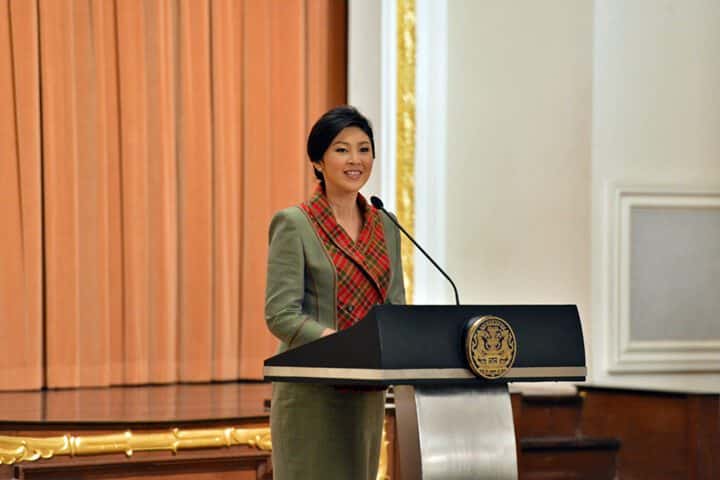
Yingluck Shinawatra – almonfoto / Shutterstock.com
Protests continued and clashes erupted between the PDRC and the UDD red shirts. The PDRC occupied some ministries and government buildings and the government began to fear another coup. The PDRC also penetrated a TV station, from which Suthep sent an ultimatum: the government should resign and be replaced by an unelected 'people's council', which would then write political reforms. Yingluck opposed this: the proposals were undemocratic and unconstitutional.
On December 9, Suthep declared the 'final blow' and rallied 160 people to protest against the government. Members of the Democrats resigned to put further pressure on the government. That same day, Yingluck dissolved the cabinet and announced new elections for February 2014. Supporters of Suthep claimed that they had seized some army headquarters and asked the army for their support. Army commander General Prayut called for calm and said he would not involve the army in the fighting. On December 17, the PDRC demanded that Yingluck resign entirely from her position along with the other outgoing cabinet members, that members of an unelected 'people's council' write reforms. These reforms had to take place before elections could be held: 'reform before election'. The Democrats have already announced that they would boycott the upcoming election.
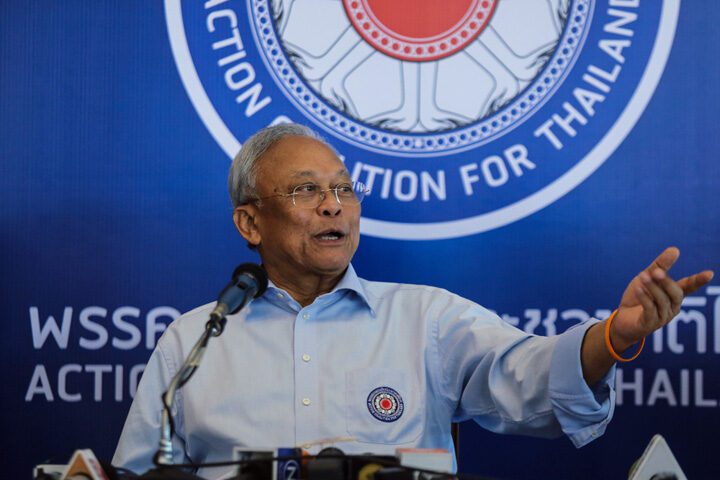
Suthep Thaugsuban – Sek Samyan / Shutterstock.com
The PDRC disrupted political party registrations by advancing towards the Thai-Japan stadium. Suthep said that if Yingluck and the Electoral Council did not respond to the PDRC, the people would come to them to make their will known. According to the PDRC, 3,5 million people took part in the protest march, according to the police, there were about 270 thousand. Two people were killed in the protests around the stadium. The government said that the elections for February had the king's approval and that the government could not change it but was willing to enter into dialogue with the demonstrators. But tensions were far from abating, on the contrary. On December 27, General Prayut said the military could not rule out a coup. An arrest warrant was issued for Suthep, but the police took no action to arrest him. In a speech at the Democracy Monument in the heart of Bangkok, Suthep addressed the audience. He said he would occupy Bangkok shortly after New Year and bring the city to a standstill, the Bangkok Shutdown.
2014: Thenew chaos in Bangkok
Yingluck said that elections would be the best way out of the political conflict and that they would have to fight through the ballot box who would study the country. Students began to demonstrate against the anti-government protesters. Escalations all increased. In mid-January, some buildings belonging to the Democrats and their members were attacked, the podium of the PDRC was also hit by an explosion and gunfire. Fortunately there were no casualties. Elsewhere in the city, several people were killed and dozens injured by explosions and gunfire. On January 21, the government declared a state of emergency. The government considered postponing the elections, but after consultation with the Electoral Council, it was decided to stick to the original date. The government said it would deploy large numbers of police, especially in Bangkok and the southern provinces, so that the elections could go ahead.
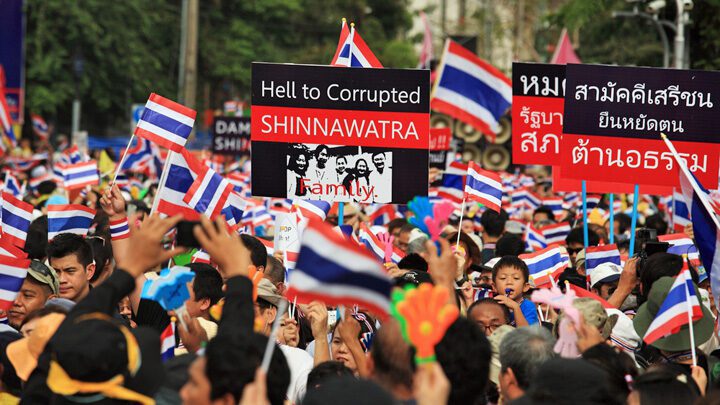
Thai protesters rally at Ratchadamnoen road in 2013 – Blanscape / Shutterstock.com
Due to all the problems, the process of 'advanced voting' went wrong, especially in the south and in Bangkok there were disruptions. There were also problems on the day of the election itself: ballots that could not be delivered due to PDRC blockades, obstructions to people wanting to vote and too few staff to man the polling stations. As a result, the elections did not comply with the constitution. After consultation within the Electoral Council, new elections were announced for the provinces that had failed to do so on 2 February. The Democrats asked the Constitutional Court to declare the elections invalid, after which Pheu Thai complained to the court that the Democrats operated undemocratically. The Constitutional Court rejected the requests of both parties.
The Ombudsman made a request to the Constitutional Court to have the elections declared invalid and on March 21 the court announced that the elections had not been conducted in accordance with the requirements of the constitution and were therefore invalid. This led to fierce criticism from academia and the Pheu Thai party. According to them, it was nothing but certain powers that did everything they could to create a power vacuum and keep Pheu Thai out of the saddle. The PDRC said it would continue to fight to see Yingluck removed from her position as outgoing prime minister and prevent elections until their desired Volksraad was appointed.
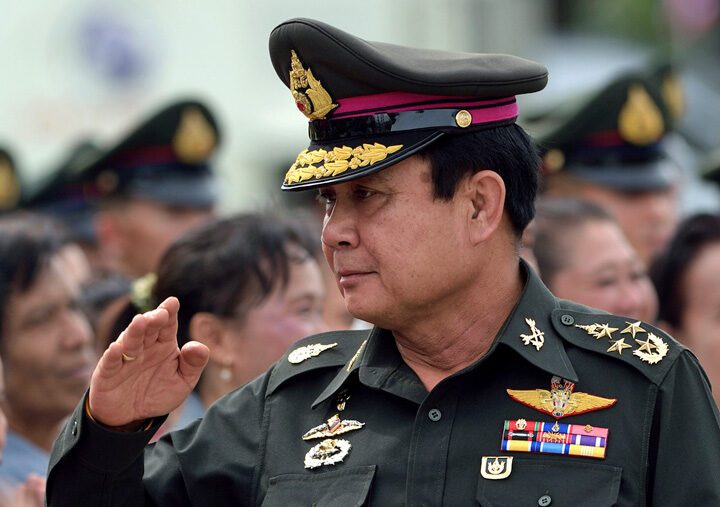
General Prayut – PKittiwongsakul / Shutterstock.com
The coup of 2014
Senator and PDRC supporter Paiboon Nitawan petitioned the Constitutional Court to remove Yingluck from office for having the (previous government) appointed head of the National Security Council, Thawil Pliensri, transferred to another position in 2011 . The court deemed Yingluck's action unconstitutional and dismissed her from her position on May 7. The protests of the PDRC continued and the UDD stirred, furious at the actions of the Constitutional Court.
On May 20, the army intervened. General prayut declared martial law nationwide (formally in violation of the constitution) and staged a coup on May 22 to install a transitional government. The junta called itself the National Council for Peace and Order (NCPO). The NCPO, through a new constitution, amnestied itself for all its actions in the service of the country. This constitution also stipulated that for the next 20 years future governments are bound by the NCPO's long-term plan. Through various reforms by the Senate, among others, the junta ensured that their military will continue to have a considerable influence on the course of the country for a long time to come. The junta imposed censorship on the media, restricted political parties, and banned gatherings of more than 4 people in order to restore calm and prepare for new elections. These were postponed again and again but were finally officially announced for February 2019. Due to the coronation of Rama 10, the elections were moved to March 24, 2019.
And that brings us to the present day. The past 20 years have been quite a rollercoaster. The question is how much closer Thailand is to walking the path of democracy, and at whom and at what cost?
Resources and more:
en.wikipedia.org/wiki/Thai_political_crisis
The Political Development of Modern Thailand, Federico Ferrara. 2015
www.thailandblog.nl/background/thailand-ontwricht-dood-thaise-stijl-democratie-slot/


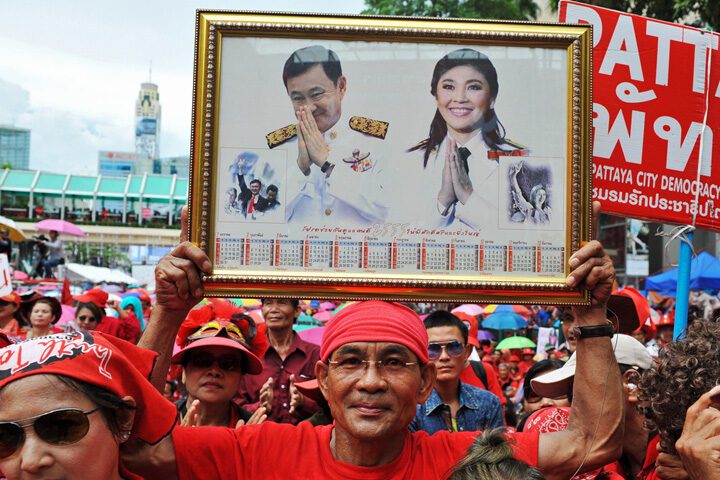
In the posting of February 24, the “Democracy Monument” is depicted where a few things happened.
Compliments for the two stories in which I had to think back to the occupation of the airport in Bangkok and had to divert to Chiangmai by bus to fly home to the Netherlands. To me, these kinds of governments are unimaginable. How I live in the Netherlands in a fantastic country where you can say anything about government leaders and monarchy with social services that you will not find anywhere in the world.
And yet many continue to grumble. You must have been born in 'fantastic' Thailand from ordinary parents. Just think about that.
Dear Joseph, I share with you the compliments for these two articles. And in the Netherlands you can indeed openly criticize ministers, administrators, members of the royal family, etc. In my opinion, sometimes it also has its disadvantages. The almost canonized freedom of expression also has its downside. Under the guise of religious freedom, some Salafists can proclaim Sharia through Imans, who do not speak a word of Dutch and are on the payroll of foreign powers. And the disrespectful way in which our king and queen are being personified on 'Lucky TV', under the motto of humor, cannot arouse my appreciation, even though I am not even a supporter of the monarchy. Of course I agree with what you write between the lines, namely that as a Thai in Thailand you have to pay attention to what and about whom you write or talk. But in the meantime, you also have to be wary of this in the Netherlands, especially the pressure from Social Media. You may not be prosecuted by the Public Prosecution Service for your opinion, but you can be threatened by fanatics and so freedom of expression appears to be limited in reality. Our Prime Minister, Mr Rutte, has his own opinion. He says that he is itching to personally beat up troublemakers during New Year's Eve. Apart from the fact that if a Dutch citizen were to actually do that, he/she would undoubtedly be prosecuted by the judiciary, I think I know that the current ruler in Thailand, a general after all, would not even think of making such a statement. to do. Oh well, it is what it is, both in Thailand and the Netherlands. With or without elections, the elite remains in control.
Prayut is more of the 'jokes' kind. Among other things, he has thrown at journalists: 'asshole! (Aî-hàa)', a banana peel (towards a journalist's head), that he could get them out of the way (it was a joke, he says…) and other fun things like that.
See e.g.: https://prachatai.com/english/node/4759
What about his "jokes" about women!
Indeed. In response to a rape, Prayut said that beautiful women should not walk around in bikinis because that is asking for trouble. The victim as guilty. He later apologized.
Dear Rob, Tino and Lagemaat, I was not aware of these statements by the general. So I realize once again that I was too hasty with my comparison and should have omitted it. Regards.
A long, long time ago I studied social history as a minor. Also graduated in it. There I learned that an overview of events, so-called facts, does not provide insight into the background of the events. The same goes for this post. An interesting overview but no insight, or in other words no increase in knowledge from which we can learn lessons for the future; unless the lessons we could have also learned without the overview.
What do you mean, chris, "so-called facts"? Why "supposedly"? Do you doubt these facts?
First the facts, then the insight.
This posting by Rob V. does contain insightful and knowledge-enhancing comments.
I mean omitting important facts. The details are important. And some facts should not be written down. This is Thailand.
Dear Chris, I think that this 2nd part is a nice general overview where the average Thailand blog visitor can take a look at what has happened in the last 20 years. For deeper insight, there are the resources I list. And the blog has an army of authors who can possibly dive deeper into a specific fact. Perhaps after reading this you yourself have something like 'well this and that can be told a bit more about', then you are free to climb into the pen to send in more in-depth blogs.
Dear Chris
History as a minor subject and later graduated in it. Nice job for you to write a good story I would think.
Thanks, a very succinct summary of the political events that have happened to none of the past (almost) 20 years were exactly my motivation behind this writing. I thought it would be useful to briefly look back now that the new elections are approaching.
The NCPO, through a new constitution, amnestied itself for all its actions in the service of the country.
“This constitution also stipulated that for the next 20 years future governments are bound by the long-term plan of the NCPO”
Isn't that in fact already the "result" of the "election", then at least a shot across the bow!
That long-term plan is so vaguely formulated that I would be glad to have formulated it. You can go in any direction with it, including the good ones.
An elected government risks being impeached if it does not (sufficiently) follow the lines of the 20-year plan. By formulating that plan so vaguely, a party can in fact always find a reason to remove an elected government from office. That is precisely the purpose of this vague plan. Suppose that despite all the efforts of the NCPO a “wrong” party wins the elections and can form a government, then that 20-year plan is the sword of Damocles.
All the more so since all relevant courts and other supposedly independent bodies, such as the Constitutional Court in this case, have actually been appointed by the military for years and carry out their will. Examples galore. Many (Thai) thinkers about Thailand call the form of government there a 'justicracy', the rule of judges. That started in 2006.
dear tina,
Your anti-authoritarian phobia is starting to take its toll. Judges in Thailand are NEVER appointed by the military but either by other judges or by the king. For the higher courts, the senate plays a role in the nomination. But even in all the years that democratic governments have been in office, judges have been appointed.
The same applies to members of other independent boards.
Dear Chris,
In Thailand, the 9 judges of the constitutional court are appointed by the King, after selection and nomination by the senate. And which members will the senate consist of again after the elections?
In fact, all “independent” bodies (EC, CC, etc.) are now appointed by the NLA, also called the “rubber stamp” body of the current junta, because their only job seems to be to vote unanimously for (or against). After the elections, these tasks will go to the senate, which, like the NLA, is selected entirely by the current junta.
But you are right that in a formal sense the King appointed.
Dear Petervz,
Tino is talking about the past, not the future.
Maybe take a look at the new Constitution of this country. In section 200, which concerns the choice of the 9 judges of the Constitutional Court, the word senate and parliament does not appear.
Read a little more Chris. From Section 203 onwards, the Senate comes into play and is frequently mentioned. Parliament plays no part.
You're absolutely right, Chris. It is the king who officially appoints the judges and must sign them. I meant selection.
In the selection of candidates for the Constitutional Court, for example, the Senate and two courts play an important role, as you yourself noted. Ultimately, it is the Senate (appointed, sorry, selected entirely by the current junta) that decides on the candidates. See section 204 chapter XI of the constitution here. I maintain that ultimately it is the military who, through others, have a decisive voice.
Section 204
A person who is elected or selected to hold the position of judge of the
Constitutional Court must obtain the approval of the Senate with the votes of not
less than one-half of the total number of the existing members of the Senate.
In the case where the Senate disapproves any selected or elected person, a new
person shall be selected or elected and thereafter submitted to the Senate for
approval.
For the enthusiasts: a link to the constitution of 2017
https://www.constituteproject.org/constitution/Thailand_2017.pdf?lang=en
No Tino. The Senate has no role in the selection. The Senate can only reject nominees but cannot come forward with candidates.
In the selection committee there is even room for the leader of the opposition…(!!)
Every government risks being dismissed by a parliament. A 1 party cannot oust the government. For that you need a majority in parliament or a ruling from the Constitutional Court.
I estimate that the situation only leads to legal hair-splitting and is good for lawyers' revenues. After all, to my knowledge there has never been a government that has offered its resignation to the king, for fear of being convicted of dereliction of duty. (nice fallacy)
Dear Chris,
Here too you are not fully informed.
Monitoring compliance with the 20-year plan does not fall under parliament, but under the authority of a “National Strategic Commission”, which in fact hangs above the elected government. The majority of the members of that committee consist of the top of the armed forces, or the current members of the NCPO.
If the committee is of the opinion that the government or one of the ministries is not complying with the plan, the NACC (anti-corruption commission) will be empowered to judge and hand out penalties. These punishments include, for example, removal from office and imprisonment.
Oh yes, the current NACC already consists of members nominated by the NLA (read Junta).
In short, the current junta, in a different form, will continue to hang over each elected government for the next 20 years as a sort of arbiter.
This is the composition of the National Strategic Commission:
The National Strategy Committee comprises the prime minister; speakers of the Houses and the Senate; a deputy prime minister or minister; Defense Permanent Secretary; chiefs of the armed forces, army, navy, air force and police; secretary general of the National Security Council; chairman of the National Economic and Social Development Board; heads of the Board of Trade, Federation of Thai Industries, Tourism Council of Thailand and Thai Bankers Association
All told 6 top soldiers/policemen; 10 politicians or other persons not appointed by the junta.
A clear overview.
Contrary to what the headline suggests, the battle is about much more than democracy, namely about a broad spectrum of interests - including democracy.
Even an enlightening overview 🙂
Too bad the title misled us. It's not about democracy at all. TiT nothing is what it seems.
Although the terms do not cover the full meaning, democracy can best be replaced by oligarchy in a plutocratic form. Kleptocracy is also possible, of course, but that is not a formal form of government.
Usually the informal functioning is more determinative for the people than the formal one. Which begs the question to what extent the people are the nation? If it is measured against the social legitimacy of ballot results, it is already small. Struggle for democracy? How so?